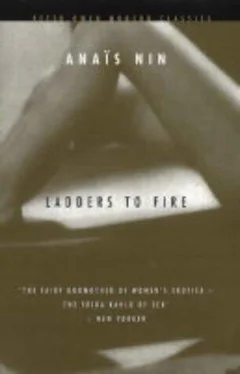Anaïs Nin - Ladders to Fire
Здесь есть возможность читать онлайн «Anaïs Nin - Ladders to Fire» весь текст электронной книги совершенно бесплатно (целиком полную версию без сокращений). В некоторых случаях можно слушать аудио, скачать через торрент в формате fb2 и присутствует краткое содержание. Год выпуска: 2004, ISBN: 2004, Издательство: Peter Owen Limited, Жанр: Классическая проза, Эротические любовные романы, на английском языке. Описание произведения, (предисловие) а так же отзывы посетителей доступны на портале библиотеки ЛибКат.
- Название:Ladders to Fire
- Автор:
- Издательство:Peter Owen Limited
- Жанр:
- Год:2004
- ISBN:9780720611625
- Рейтинг книги:5 / 5. Голосов: 1
-
Избранное:Добавить в избранное
- Отзывы:
-
Ваша оценка:
- 100
- 1
- 2
- 3
- 4
- 5
Ladders to Fire: краткое содержание, описание и аннотация
Предлагаем к чтению аннотацию, описание, краткое содержание или предисловие (зависит от того, что написал сам автор книги «Ladders to Fire»). Если вы не нашли необходимую информацию о книге — напишите в комментариях, мы постараемся отыскать её.
Cities of the Interior
Children of the Albatross
The Four-Chambered Heart
A Spy in the House of Love
Solar Barque
Ladders to Fire — читать онлайн бесплатно полную книгу (весь текст) целиком
Ниже представлен текст книги, разбитый по страницам. Система сохранения места последней прочитанной страницы, позволяет с удобством читать онлайн бесплатно книгу «Ladders to Fire», без необходимости каждый раз заново искать на чём Вы остановились. Поставьте закладку, и сможете в любой момент перейти на страницу, на которой закончили чтение.
Интервал:
Закладка:
Sitting at the bar he immediately created a climate, a tropical day. In spite of the tension in her, Lillian felt it. Sitting at a bar with his voice rolling over, he dissolved and liquefied the hard click of silver on plates, the icy dissonances of glasses, the brittle sound of money thrown on the counter.
He was tall but he carried his tallness slackly and easily, as easily as his coat and hat, as if all of it could be discarded and sloughed off at any moment when he needed lightness or nimbleness. His body large, shaggy, as if never definitely chiseled, never quite ultimately finished, was as casually his as his passing moods and varying fancies and fortunes.
He opened his soft animal mouth a little, as if in expectancy of a drink. But instead, he said (as if he had absorbed Lillian’s face and voice in place of the drink), “I’m happy. I’m too happy.” Then he began to laugh, to laugh, to laugh, with his head shaking like a bear, shaking from right to left as if it were too heavy a head. “I can’t help it. I can’t help laughing. I’m too happy. Last night I spent the night here. It was Christmas and I didn’t have the money for a hotel room. And the night before I slept at a movie house. They overlooked me, didn’t sweep where I lay. In the morning I played the movie piano. In walked the furious manager, then he listened, then he gave me a contract starting this evening. Christ, Lillian, I never thought Christmas would bring me anything, yet it brought you.”
How gently he had walked into her life, how quietly he seemed to be living, while all the time he was drawing bitter caricatures on the bar table, on the backs of envelopes. Drawing bums, drunks, derelicts.
“So you’re a pianist…that’s what I should have been. I’m not bad, but I would never work hard enough. I wanted also to be a painter. I might have been a writer too, if I had worked enough. I did a bit of acting too, at one time. As it is, I guess I’m the last man on earth. Why did you single me out?”
This man who would not be distinguished in a crowd, who could pass through it like an ordinary man, so quiet, so absorbed, with his hat on one side, his steps dragging a little, like a lazy devil enjoying everything, why did she see him hungry, thirsty, abandoned?
Behind this Jay,with his southern roguishness, perpetually calling for drinks, why did she see a lost man?
He sat like a workman before his drinks, he talked like a cart driver to the whores at the bar; they were all at ease with him. His presence took all the straining and willing out of Lillian. He was like the south wind: blowing when he came, melting and softening, bearing joy and abundance.
When they met, and she saw him walking towards her, she felt he would never stop walking towards her and into her very being: he would walk right into her being with his soft lazy walk and purring voice and his mouth slightly open.
She could not hear his voice. His voice rumbled over the surface of her skin, like another caress. She had no power against his voice. It came straight from him into her. She could stuff her ears and still it would find its way into her blood and make it rise.
All things were born anew when her dress fell on the floor of his room.
He said: “I feel humble, Lillian, but it is all so good, so good.” He gave to the word good a mellowness which made the whole room glow, which gave a warmer color to the bare window, to the woolen shirt hung on a peg, to the single glass out of which they drank together.
Behind the yellow curtain the sun seeped in: everything was the color of a tropical afternoon.
The small room was like a deep-set alcove. Wto the barist and warm blood; the high drunkenness which made Jay flushed and heavy blooded. His sensual features expanded.
“As soon as you come, I’m jubilant.” And he did somersaults on the bed, two or three of them.
“This is fine wine, Lillian. Let’s drink to my failure. There’s no doubt about it, no doubt whatever that I’m a failure.”
“I won’t let you be a failure,” said Lillian.
“You say: I want, as if that made things happen.”
“It does.”
“I don’t know what I expect of you. I expect miracles,” He looked up at her slyly, then mockingly, then gravely again. “I have no illusions,” he said.
Then he sat down with his heavy shoulders bowed, and his head bowed, but Lillian caught that swift, passing flash, a moment’s hope, the lightning passage of a spark of faith left in his indifference to his fate. She clung to this.
Jay—gnome and sprite and faun, and playboy of the mother-bound world. Brightly gifted, he painted while he enjoyed the painting; the accidental marvels of colors, the pleasant shock of apparitions made in a game with paint. He stopped painting where the effort began, the need for discipline or travail. He danced while he was allowed to improvise, to surprise himself and others, to stretch, laugh, and court and be courted; but stopped if there were studying, developing or disciplining or effort or repetition involved. He acted, he acted loosely, flowingly, emotionally, while nothing more difficult was demanded of him, but he evaded rehearsals, fatigue, strain, effort. He pursued no friend, he took what came.
He gave himself to the present moment. To be with the friend, to drink with the friend, to talk with the friend, he forgot what was due the next day, and if it were something which demanded time, or energy, he could not meet it. He had not provided for it. He was asleep when he should have been awake, and tired when his energy was required, and absent when his presence was summoned. The merest expectation from a friend, the most trivial obligation, sent him running in the opposite direction. He came to the friend while there was pleasure to be had. He left as soon as the pleasure vanished and reality began. An accident, an illness, poverty, a quarrel—he was never there for them.
It was as if he smelled the climate: was it good? Was there the odor of pleasure, the colors of pleasure? Expansion, forgetfulness, abandon, enjoyment? Then he stayed. Difficulties? Then he vanished.
Lillian and Jay.
It was a merciless winter day. The wind persecuted them around the corners of the street. The snow slid into their collars. They could not talk to each other. They took a taxi.
The windows of the taxi had frosted, so they seemed completely shut ofom the rest of the world. It was small and dark and warm. Jay buried his face in her fur. He made himself small. He had a way of becoming so passive and soft that he seemed to lose his height and weight. He did this now, his face in her fur, and she felt as if she were the darkness, the smallness of the taxi, and were hiding him, protecting him from the elements. Here the cold could not reach him, the snow, the wind, the daylight. He sheltered himself, she carried his head on her breast, she carried his body become limp, his hands nestling in her pocket. She was the fur, the pocket, the warmth that sheltered him. She felt immense, and strong, and illimitable, the boundless mother opening her arms and her wings, flying to carry him somewhere; she his shelter and refuge, his secret hiding place, his tent, his sky, his blanket.
The soundproof mother, the shockproof mother of man!
This passion warmer, stronger than the other passion, annihilating desire and becoming the desire, a boundless passion to surround, envelop, sustain, strengthen, uphold, to answer all needs. He closed his eyes. He almost slept in her warmth and furriness. He caressed the fur, he feared no claws, he abandoned himself, and the waves of passion inspired by his abandon intoxicated her.
He usually wore colored shirts to suit his fancy. Once he wore a white one, because it had been given to him. It did not suit him. Whiteness and blackness did not suit him. Only the intermediate colors.
Читать дальшеИнтервал:
Закладка:
Похожие книги на «Ladders to Fire»
Представляем Вашему вниманию похожие книги на «Ladders to Fire» списком для выбора. Мы отобрали схожую по названию и смыслу литературу в надежде предоставить читателям больше вариантов отыскать новые, интересные, ещё непрочитанные произведения.
Обсуждение, отзывы о книге «Ladders to Fire» и просто собственные мнения читателей. Оставьте ваши комментарии, напишите, что Вы думаете о произведении, его смысле или главных героях. Укажите что конкретно понравилось, а что нет, и почему Вы так считаете.












